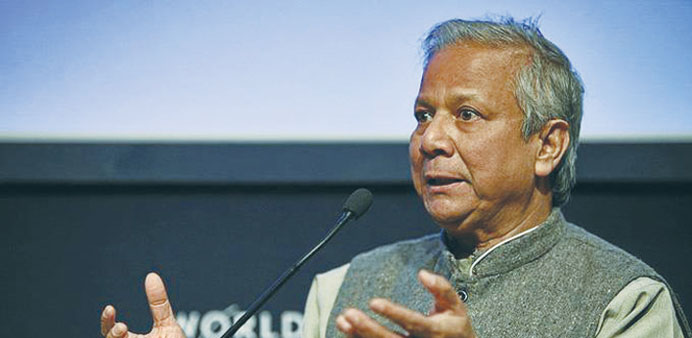By Nazrul Islam, DPA
Dhaka
Nobel laureate and micro-credit pioneer Muhammad Yunus, who turned 75 yesterday, says people should continue working until their last breath and that the word “retirement” should be sent into retreat.
“Human beings must remain active until the last breath. There is no reason why there should be a pause, a stop at any point. So there is no question of retirement,” Yunus said on the eve of his birthday.
Yunus, who was awarded the Nobel Peace Prize in 2006 jointly with his micro-lending Grameen Bank, also advocated: “It (working throughout one’s life) is not only for me, it should be for everyone.”
Grameen Bank has been providing micro-finance to the poor, mostly women, since its creation in 1983.
But the system, originally praised for reaching those excluded from normal commercial credit, came under criticism for encouraging debt and taking excessive profits.
In March 2011, Yunus was removed by the government from the bank’s top position in a dispute over the age of retirement.
Grameen Bank was criticised in a 2010 Norwegian documentary that alleged Yunus transferred $100mn, given to the bank by the Norway’s state development agency and other donors, to Grameen Kalyan - a non-profit affiliate - in 1996 without following the conditions
stipulated by the donors.
He denied any wrongdoing and a government investigation also found no corruption in the bank’s fund management, but it said the fund diversion did not meet Grameen’s own guidelines.
Yunus’ legacy is that the idea of micro-credit introduced in Bangladesh aimed at poverty reduction is now being replicated in many countries around the world. He says “access to credit is a human right” despite criticism that the average impact of micro-credit on poverty of citizens is zero.
More than half of the world’s population has no access to credit and the mainstream banking system has failed to deliver, he says.
“We have to find ways so that we can reach out to even the poorest people in a very sustainable way,” Yunus adds, explaining that micro-finance is a business like any other venture.
Yunus, known as the banker of the poor, launched the idea of “social business” along with Hans Reitz of the German-based organisation Grameen Creative Lab in 2009. It sparked global initiatives in Uganda, Haiti, Albania, India, Colombo, Brazil and Tunisia.
Yunus launched an international campaign to popularize the concept of tackling social issues, ranging from children’s nutritional deficiencies to lack of affordable footwear for the poor, through business.
The next global summit for social business will be held in Berlin in November.
Yunus says every time he tries to address a particular problem, he creates a business to solve it.
He had once said that some day poverty would become a museum artefact. Asked whether he still foresees that, he set a timeline of 2030 for Bangladesh and 2050 for the rest of the world.
“After 2050, nobody in the world should be a poor person. There is no reason for that,” he says. Poverty was neither manmade nor was it created by god, he adds, but by the social, financial and business system.
He suggests redesigning the financial and business systems responsible for creating poverty, and encouraging entrepreneurship rather than seeking for jobs.

Muhammad Yunus: u201cHuman beings must remain active until the last breath.u201d
